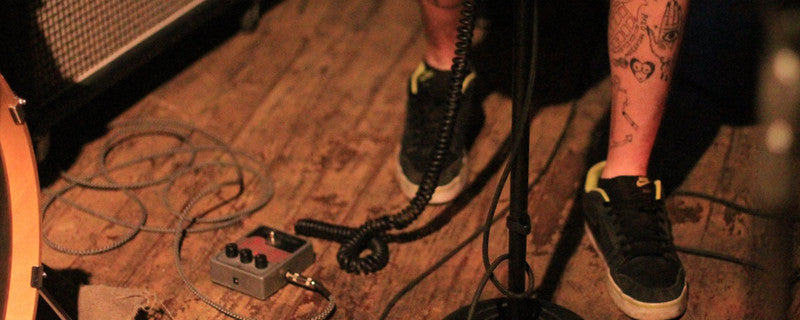
Disenfranchised Arts Communities Struggle to Exist in a Post-Ghost Ship World
Original Fuzz contributor Kari Leigh Ames takes us down to the trenches of the civil clash between DIY art & music spaces and those who wish to legitimize them. After the loss of too many precious and creative lives in the fire of Oakland's Ghost Ship, DIY communities across the U.S. are facing incredible hardships, most being forced to shut down. Find out what's happening in the ongoing pursuit to keep these scenes alive, and what's to become of the one here in Nashville.
 NYE Crowd/ Emily Quirk
NYE Crowd/ Emily Quirk
Late on December 2, 2016, a catastrophe occurred that resonated with nearly every creative soul in the world. A fire ignited in a warehouse in Oakland, California during a house music dance party where 36 people, including three of the five acts slated to play the show, perished in the blaze. The warehouse was known as the Ghost Ship, home to many and often used to host various events and parties. In a few moments, a safe haven for musicians and artists was transformed into a death trap.
Criminal and arson investigations were initiated soon after but, ultimately, it was determined a faulty electrical system was most likely the catalyst for the inferno. The creative director of the artist collective in the Ghost Ship claims the group had previously notified the owner of the building, Chor Ng, about potential electrical issues throughout the warehouse.
 Inside Ghost Ship/ Rolling Stone.
Inside Ghost Ship/ Rolling Stone.
Ms. Ng owns numerous other properties in the area that have incurred building codes violations in the past. Previous tenants and neighbors had supposedly reported unsafe conditions to authorities. A fire station is located roughly 500 feet from the warehouse, but no one had ever filed for an occupancy permit and records show the city hadn't inspected the building in 30 years. These facts, in addition to a nasty report submitted by the Alameda County Grand Jury in 2011 alleging poor management and lack of structure in Oakland's building services division, have caused many to question who to blame for the unfortunate loss of so many precious and talented lives. They raise a good inquiry: How could not a single firefighter or city worker have visually assessed the building for potential calamity in the several years it was inhabited?
Stories have been relayed from Baltimore, Denver, Colorado Springs, L.A., Philadelphia, and Nashville, among other cities, of the suppression of DIY communities since the Ghost Ship tragedy. All of these cities reacted similarly. Local powers have been dispatched to break up gatherings in makeshift venues across the country in a time when organizing a legitimate venue has become expensive and exclusionary. Many of these DIY venues have not and may not reopen. Rolling Stone reports authorities may be receiving anonymous tips from 4chan users, in the name of fire safety. A meme recently circulated online detailing how to submit information to officials regarding illegal house venues (nicknamed "leftspaces"), claiming it will help subdue the political dissension created by the recent Presidential Election.
 Queen Ave Art Collective/ Nashville Scene.
Queen Ave Art Collective/ Nashville Scene.
After a "Concerned Parent" sent an email to the office of the Mayor of Nashville, as well as to several other city officials, a local art and music collective known as DRKMTTR was visited by Nashville's fire marshal and police officers during a performance by garage rocker Nobunny. The show was promptly shut down and forced to relocate to a bar nearby, effectively removing anyone below the age of 21 from attendance.
Olivia Scibelli, one of the ten people that combined their know-how and experiences in DIY scenes to found DRKMTTR, explained to Original Fuzz that, "people under 21 are a huge part of the scene. Those kids need these DIY spaces the most." She also estimates that as much as 80% of the shows she has attended in her life have been in similarly non-traditional venues.

Olivia Scibelli, Idle Bloom.
With every catastrophe comes a lesson and, amidst the crackdowns and blaming, there will always be those that use this learning experience to move forward with initiatives to improve their surroundings. In response, Oakland mayor Libby Schaaf has announced $1.7 million to invest in the local arts community, intent on creating safe and affordable spaces for artists and their organizations. She then issued an executive order to review tenant protections in cases of displacement caused by evictions due to codes violations and told reporters that city workers would not be held at fault, but “rather, we will provide them the guidance, clarity and support they need and deserve to do their jobs."
DIY venue organizers and other unsung leaders of these communities have been mobilized by this tragic awakening to amass all of their shared knowledge about harm reduction for DIY venues with a Google doc. The continuously updated document outlines ways to modify locations for optimal safety, including diagrams and links to other resources.
 Remembering Oakland Ghost Ship Victims/ LA Times.
Remembering Oakland Ghost Ship Victims/ LA Times.
One thing is left certain, these places are crucial to communities in almost every city in America and beyond. However, the future of such collectives is unclear. Scibelli concluded, "I want to emphasize that it's not just about showing up, cracking some beers and getting rowdy at the punk show. It's about fostering a global scene. It's about providing a safer space for people to enjoy music and art in areas like Nashville that are literally pushing artists out of affordable spaces. I wish we didn't lose sight of the fact that simply sharing art and experience, without a bottom line, fuels the world."—KLA
Get involved with your community in protecting your local DIY spaces. Cover image by Renata Scarpelli.
Kari Leigh Ames wears many hats. You can follow her @karileighames on Instagram to learn more.
